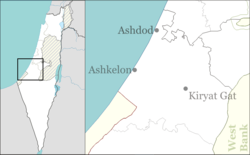Arugot: Difference between revisions
Appearance
Content deleted Content added
Greyshark09 (talk | contribs) |
Greyshark09 (talk | contribs) No edit summary |
||
| Line 4: | Line 4: | ||
| imgsize = 250 |
| imgsize = 250 |
||
| founded = 1949 |
| founded = 1949 |
||
| founded_by = [[Poland|Polish]] and [[Romania]]n immigrants |
| founded_by = [[Poland|Polish]] and [[Romania]]n Jewish immigrants |
||
| council = [[Be'er Tuvia Regional Council]] |
| council = [[Be'er Tuvia Regional Council]] |
||
| affiliation = [[Moshavim Movement]] |
| affiliation = [[Moshavim Movement]] |
||
Revision as of 06:51, 26 August 2019
Arugot | |
|---|---|
 | |
| Coordinates: 31°44′4.92″N 34°46′14.51″E / 31.7347000°N 34.7706972°E | |
| Country | Israel |
| Council | Be'er Tuvia Regional Council |
| Affiliation | Moshavim Movement |
| Founded | 1949 |
| Founded by | Polish and Romanian Jewish immigrants |
| Population (2022)[1] | 1,154 |
Arugot (Template:Lang-he-n, lit. Flowerbeds) is a moshav in central Israel. Located near Kiryat Malakhi, it falls under the jurisdiction of Be'er Tuvia Regional Council. In 2022 its population was 1,154.[1]
History
The moshav was founded in 1949 by immigrants from Poland and Romania on the land belonging to the depopulated Palestinian village of Qastina.[2] Its name was taken from Chapter 17, verse 7 of the Book of Ezekiel.[3]
References
- ^ a b "Regional Statistics". Israel Central Bureau of Statistics. Retrieved 21 March 2024.
- ^ Khalidi, Walid (1992). All That Remains: The Palestinian Villages Occupied and Depopulated by Israel in 1948. Washington D.C.: Institute for Palestine Studies. p. 131. ISBN 0-88728-224-5. ISBN 0-88728-224-5.
- ^ Mapa's concise gazetteer of Israel (in Hebrew). Yuval Elʻazari (ed.). Tel-Aviv: Mapa Publishing. 2005. p. 435. ISBN 965-7184-34-7.
{{cite book}}: CS1 maint: others (link)

